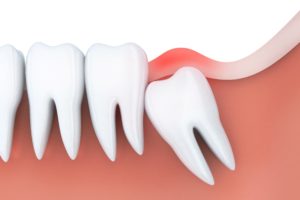 Wisdom teeth are the third set of molars that generally erupt between the ages of 17-25, but they can make their appearance at any time during adulthood. They once served an important purpose, allowing humans to chew tough foods. However, they aren’t really necessary anymore. Human jaws have narrowed over time, which means there’s less room for them to come in properly. This can lead to overcrowding, infections, and pain. If your wisdom teeth are giving you grief, here’s what might be behind your pain and what can be done to give you relief.
Wisdom teeth are the third set of molars that generally erupt between the ages of 17-25, but they can make their appearance at any time during adulthood. They once served an important purpose, allowing humans to chew tough foods. However, they aren’t really necessary anymore. Human jaws have narrowed over time, which means there’s less room for them to come in properly. This can lead to overcrowding, infections, and pain. If your wisdom teeth are giving you grief, here’s what might be behind your pain and what can be done to give you relief.
Common Causes of Wisdom Tooth Pain
Many people eventually have issues with their wisdom teeth. It is rare for them to erupt perfectly. Pain is a common complication caused by the third molars, which can be from:
- Impaction: 90% of people with wisdom teeth have at least one impacted tooth. Partial and full impactions can cause inflammation, cysts, infections, and pain.
- Infections: It’s not unusual for impacted wisdom teeth to cause infections.
- Overcrowding: If there’s not enough room in the mouth, third molars can push teeth out of position to accommodate them. This can lead to pain and overcrowding.
Managing Wisdom Tooth Pain
If you’re suffering from wisdom tooth pain, it’s important to schedule a consultation with your dentist to determine if your teeth need to be removed. While you wait for your appointment, here are a few tips to manage your pain at home:
- Rinse with Salt Water: Rinse your mouth with salt water to reduce pain and inflammation. It will also kill harmful bacteria.
- Manage Pain: Take an OTC pain reliever and apply a cold compress.
- Choose Soft Foods: Eat soft foods that require minimal chewing.
Wisdom Tooth Removal
If your dentist recommends having your wisdom teeth removed, don’t fret. 5 million Americans require wisdom tooth removal annually. Depending on your situation, you’ll require either:
- Simple Extraction: A tooth fully visible above the gum tissue can be loosened and extracted with forceps.
- Surgical Extraction: Full or partial impactions must be removed surgically. An oral surgeon will open the gum tissue to gain access to your tooth. It will be broken into smaller pieces to make it easier to take out. Your gum tissue will be sutured closed to allow for proper healing.
If you’re experiencing wisdom tooth pain, don’t ignore it. Your dentist can stop your discomfort and improve your oral health using a personalized plan.
About Dr. Pedram Yaghmai
Dr. Yaghmai earned his dental degree at Virginia Commonwealth University and has continued his education in oral and maxillofacial surgery. He specializes in surgical tooth extractions, TMJ surgery, bone grafting, and more. He is a member of the American Association of Oral & Maxillofacial Surgeons and many other professional organizations. Request an appointment through his website or call (571) 200-2038.
